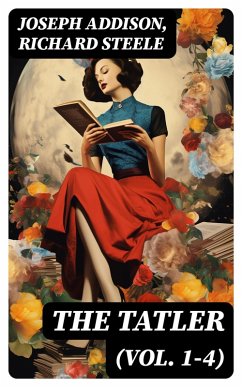
Renaissance in Italy (Vol. 1-7) (eBook, ePUB)
Complete Edition

PAYBACK Punkte
0 °P sammeln!
John Addington Symonds' monumental work, "Renaissance in Italy" spans seven volumes, offering an unparalleled examination of the cultural, artistic, and intellectual revival that characterized Italy from the 14th to the 17th centuries. With a meticulous literary style that blends rigorous scholarly analysis and vivid narrative, Symonds explores the evolution of Renaissance thought and its profound impacts on European culture. The text weaves together biographical portraits of key figures-artists, thinkers, and patrons-while situating them within their historical contexts, thus illuminating the...
John Addington Symonds' monumental work, "Renaissance in Italy" spans seven volumes, offering an unparalleled examination of the cultural, artistic, and intellectual revival that characterized Italy from the 14th to the 17th centuries. With a meticulous literary style that blends rigorous scholarly analysis and vivid narrative, Symonds explores the evolution of Renaissance thought and its profound impacts on European culture. The text weaves together biographical portraits of key figures-artists, thinkers, and patrons-while situating them within their historical contexts, thus illuminating the intricate interplay between individual genius and collective societal transformations during this vibrant epoch. Symonds, a prominent Victorian scholar with deep interests in both literature and art, was profoundly influenced by his philosophical views, particularly the celebration of beauty and the human spirit. His background in classical studies, combined with his pioneering work on sexuality in relation to art, enabled him to approach the Renaissance not merely as a historical period but as a vital expression of human potential and creativity. His personal experiences and struggles with sexuality and identity frequently infuse his writing with depth and sincerity, enriching his exploration of Renaissance ideals. Readers seeking a comprehensive understanding of the Italian Renaissance will find Symonds' "Renaissance in Italy" an indispensable resource. Its thorough research and rich prose not only captivate scholars but also engage general readers with a passion for art, history, and literature. This work invites continued reflection on the lasting legacy of the Renaissance, making it a timeless classic worthy of a place on every enthusiast's bookshelf.
Dieser Download kann aus rechtlichen Gründen nur mit Rechnungsadresse in A, B, BG, CY, CZ, D, DK, EW, E, FIN, F, GR, H, IRL, I, LT, L, LR, M, NL, PL, P, R, S, SLO, SK ausgeliefert werden.













